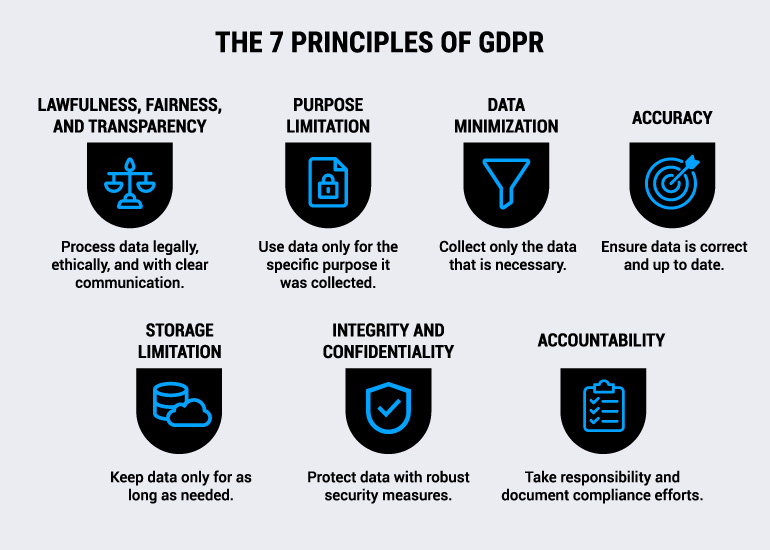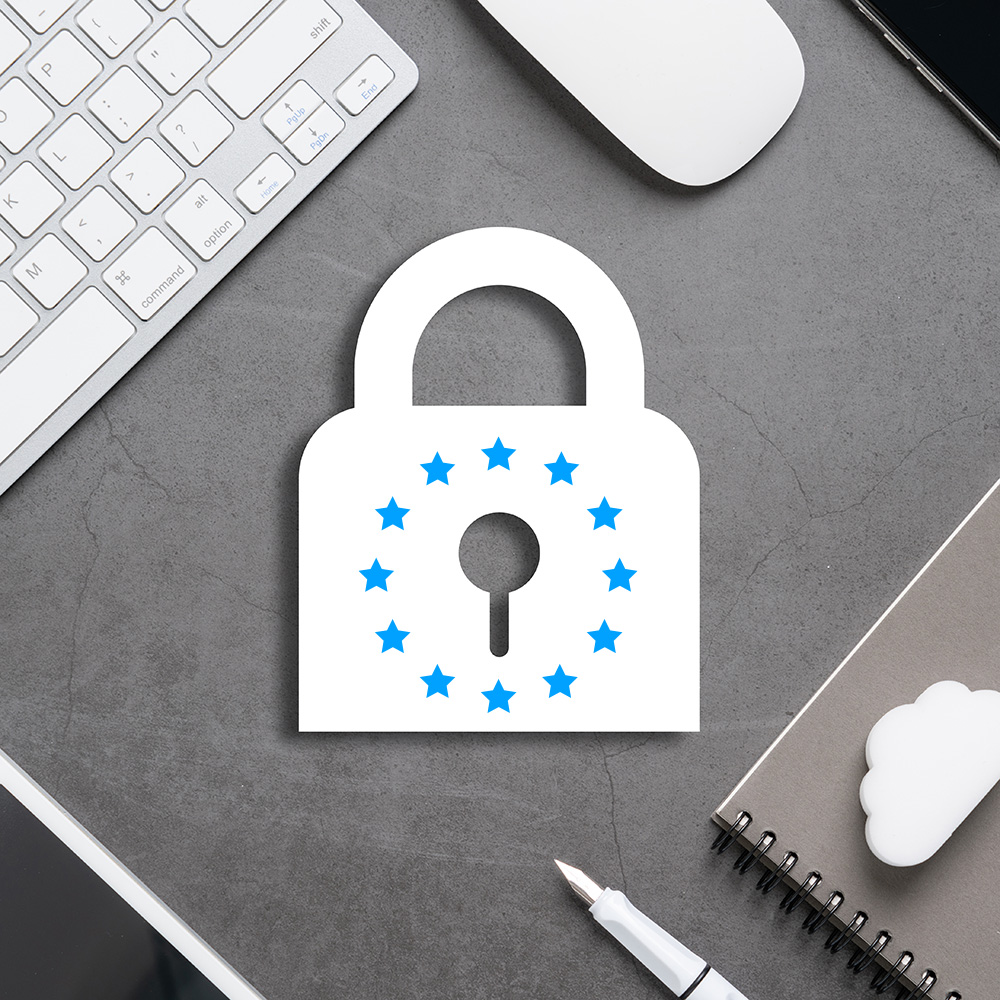Introduced in 2018, the General Data Protection Regulation (GDPR) applies to any company handling the personal data of individuals within the European Union, regardless of where the business is based. At its core, there are seven guiding principles that dictate how organizations collect, store, and use personal data.
Understanding these principles is more than just a legal requirement. It’s a vital step toward building trust with your customers and safeguarding your company from potential regulatory violations and penalties. These principles outline how to approach data processing transparently and ethically, helping you align your business practices with legal obligations and customer expectations.
Let’s explore these 7 data protection principles in detail and look at how they can be practically applied to your operations. By understanding these foundations, you’re one step closer to compliance and strengthening your company’s reputation.
What are the principles of GDPR?
The GDPR incorporates 7 principles, as outlined in Article 5 of the regulation. These form the backbone of compliant data protection practices. They serve as a set of rules for how organizations should handle and process personal data ethically, transparently, and securely.
The 7 principles of the GDPR are:
- Lawfulness, fairness, and transparency
- Purpose limitation
- Data minimization
- Accuracy
- Storage limitations
- Integrity and confidentiality
- Accountability
These principles act as a framework, guiding businesses in everything from collecting various types of consent to implementing security measures.
These 7 core principles of the GDPR are not optional guidelines. Instead, they are legally binding standards for any company that handles personal data, whether it’s an ecommerce business, healthcare provider, or multinational corporation.

Why are GDPR principles important?
The importance of these data protection principles extends far beyond avoiding fines. Still, the financial penalties for noncompliance can be significant, reaching up to EUR 20 million or 4 percent of a business’s annual global turnover. However, adhering to these principles is also critical for building customer trust, avoiding reputational damage, and meeting comparable requirements increasingly being levied by important tech platforms, like those for advertising.
Consumers are also more aware of their privacy rights than ever. Businesses that demonstrate transparency and accountability in their data practices are more likely to increase engagement and gain loyalty. In addition, adhering to the principles of the GDPR provides operational clarity, helping companies streamline processes and reduce inefficiencies. Clear, well-defined policies reduce confusion about data handling, helping employees and systems work in harmony to meet compliance standards.
On a broader scale, these principles help create a culture of accountability. When companies consistently prioritize data protection, they encourage responsible behavior and set a high standard for others in their industries. This proactive approach not only safeguards individual rights, but also positions businesses as leaders in privacy and ethics.
Read about GDPR implementation now
The 7 GDPR principles your company needs to know about (with examples)
1. Lawfulness, fairness, and transparency
This principle forms the bedrock of GDPR compliance. It requires that all processing of personal data must be lawful, fair, and transparent.
Let’s take a closer look at what that means in practice. Lawfulness means having a valid legal basis for collecting and using data. The GDPR provides six legal bases, of which companies (the controller) must validly use and document at least one to justify the collection of personal data:
- informed consent from the data subject
- performance of a contract with the data subject
- compliance with a legal obligation to which the data controller is subject
- protecting the vital interests of the data subject or of another natural person
- in the public interest, or if the data controller is exercising official authority
- legitimate interests pursued by the controller or by a third party
Fairness requires that data is not used in a way that is misleading or harmful to the individual. Transparency refers to providing clear, accessible information about how data will be used and secured, and about data subjects’ rights and how they can exercise them.
For instance, when an ecommerce site collects an email address for marketing purposes, it must also provide information to the user. It should include details like how frequently emails will be sent and what topics or information they will contain. Without clarity, users may feel misled, which damages trust and can breach GDPR principles.
Your company’s privacy policy should clearly explain how customer data is used, including for delivery and marketing emails. You also need to provide an easy opt-out option.
It’s worth noting that transparency goes hand in hand with effective communication. Privacy policies should be written in plain language and made easily accessible. This helps individuals understand their rights and the organization’s data practices.
2. Purpose Limitation
Purpose limitation requires that personal data be collected for a specific, legitimate, and communicated purpose and not used for anything else. Businesses must clearly define why they are collecting data and stick to those boundaries. Repurposing data for different uses, or collecting new types of data for an existing use — without explicit consent — violates this core GDPR principle.
Imagine a fitness app that collects user data to track exercise habits. If the company later uses this data to target ads for unrelated products without user consent, it breaches this GDPR principle. Purpose limitation prevents such misuse, and gives individuals control over how their data is handled.
Businesses must document the intended use of data at the point of collection. A consent management platform helps with this, enabling companies to granularly list out the data processing services in use, along with what data they collect and for what purposes. Regular audits can also help ensure that data usage aligns with declared purposes. If new purposes arise, obtain additional consent before proceeding.
3. Data Minimization
Data minimization dictates that businesses should only collect the data that is strictly necessary for their declared purpose. Over-collection not only increases the risk in the event of a data breach or other compliance violation, but also complicates compliance efforts and can raise concerns from customers about the actual need for the data. Collecting excessive or irrelevant information is strongly discouraged under the GDPR.
For example, a job application form should only ask for the details necessary to assess a candidate’s qualifications. Questions about personal hobbies, family status, or unrelated credentials could violate this principle. By minimizing data collection, businesses reduce exposure to risks while streamlining their operations.
Data minimization also involves periodically reviewing stored information to ensure relevance. Outdated or unnecessary data should be securely deleted or anonymized. This not only enhances compliance but also improves data management efficiency.
4. Accuracy
The accuracy principle requires that personal data be accurate and, where necessary, kept up to date. Companies must take every reasonable step to erase or rectify inaccurate personal data without delay, particularly when requested by the data subject. Inaccurate information can lead to poor decision-making and, in some cases, harm to the individual whose data is being processed.
For instance, a delivery service relying on outdated customer addresses may waste resources and inconvenience customers. Instead, the delivery service could offer customers the option to update their delivery preferences and personal information via their online account. By establishing mechanisms for regular updates and corrections, businesses can maintain accuracy and efficiency.
Enabling individuals to easily update their information or easily make requests for it to be done is key for privacy compliance. Whether through self-service portals or responsive customer support, maintaining data accuracy benefits both the business and its customers.
5. Storage limitation
Storage limitation requires organizations to retain personal data for only as long as is necessary for the specified purpose. Keeping data indefinitely increases security risks and can negatively impact customer (or former customer) experience.
For example, a subscription service might delete user accounts after two years of inactivity, since their information is no longer necessary. They may also anonymize purchase data after five years so it can be used for long-term trend analysis, but can no longer be linked to individual customers. Businesses should maintain clearly defined retention schedules, and should have policies in place for secure deletion or anonymization.
It’s important to balance operational needs with privacy obligations. Regular audits can help identify data that is no longer needed, which reduces risks and supports compliance.
6. Integrity and confidentiality (security)
This principle of integrity and confidentiality seeks to protect data against unauthorized access, loss, or destruction. Businesses must implement robust security measures, including encryption, firewalls, and access controls.
Consider a healthcare provider storing sensitive patient records. Without proper encryption and restricted access, these records could be exposed in a data breach, causing significant harm to individuals, a major investigation by authorities, and reputational damage to the organization.
Implementing measures like strong encryption for data both in transit and at rest is recommended. Use access controls to ensure that only authorized personnel can access customer data, and only within the bounds of their job responsibilities, and conduct regular security audits.
Training employees in data protection practices is equally important, and needs to be done regularly to build strong habits. Human error is a leading cause of data breaches and sensitive data exposure. Raise awareness about security protocols to help mitigate this risk. Regularly updating systems and conducting security assessments will further enhance compliance.
7. Accountability
Accountability requires organizations to take responsibility for their data practices and demonstrate compliance with the core GDPR principles. This involves documenting data processing activities, conducting regular audits, and appointing a Data Protection Officer (DPO) if necessary.
For instance, a marketing agency might maintain detailed records of how client data is processed, in addition to conducting regular data protection impact assessments and creating a comprehensive data protection policy. These records provide a clear trail of accountability, which supports transparency and aids compliance efforts.
Accountability also means staying informed about evolving data protection regulations, frameworks, and requirements, and adapting practices accordingly. Demonstrating a proactive approach to compliance builds trust with customers and partners and strengthens your organization’s reputation.
Read about GDPR compliance software now
Follow the 7 principles for GDPR compliance
The seven principles of the GDPR provide a clear roadmap for responsible data management. This is not only required to do business in the EU, but provides a valuable framework for businesses anywhere in the world that want to take strong measures for data privacy and protection. By adhering to these principles, businesses can not only comply with legal requirements but also build stronger relationships with customers and partners, foster transparency, and reduce risks.
Integrating these principles into your operations supports secure and ethical handling of personal data, and sets your company apart as a leader in data privacy and protection.



